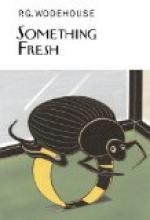The American’s force and nervous energy fascinated Lord Emsworth. As for Mr. Peters, nothing like the earl had ever happened to him before in a long and varied life. Each, in fact, was to the other a perpetual freak show, with no charge for admission. And if anything had been needed to cement the alliance it would have been supplied by the fact that they were both collectors.
They differed in collecting as they did in everything else. Mr. Peters’ collecting, as has been shown, was keen, furious, concentrated; Lord Emsworth’s had the amiable dodderingness that marked every branch of his life. In the museum at Blandings Castle you could find every manner of valuable and valueless curio. There was no central motive; the place was simply an amateur junk shop. Side by side with a Gutenberg Bible for which rival collectors would have bidden without a limit, you would come on a bullet from the field of Waterloo, one of a consignment of ten thousand shipped there for the use of tourists by a Birmingham firm. Each was equally attractive to its owner.
“My dear Mr. Peters,” said Lord Emsworth sunnily, advancing into the room, “I trust I am not unpunctual. I have been lunching at my club.”
“I’d have asked you to lunch here,” said Mr. Peters, “but you know how it is with me . . . I’ve promised the doctor I’ll give those nuts and grasses of his a fair trial, and I can do it pretty well when I’m alone with Aline; but to have to sit by and see somebody else eating real food would be trying me too high.”
Lord Emsworth murmured sympathetically. The other’s digestive tribulations touched a ready chord. An excellent trencherman himself, he understood what Mr. Peters must suffer.
“Too bad!” he said.
Mr. Peters turned the conversation into other channels.
“These are my scarabs,” he said.
Lord Emsworth adjusted his glasses, and the mild smile disappeared from his face, to be succeeded by a set look. A stage director of a moving-picture firm would have recognized the look. Lord Emsworth was registering interest—interest which he perceived from the first instant would have to be completely simulated; for instinct told him, as Mr. Peters began to talk, that he was about to be bored as he had seldom been bored in his life.
Mr. Peters, in his character of showman, threw himself into his work with even more than his customary energy. His flow of speech never faltered. He spoke of the New Kingdom, the Middle Kingdom, Osiris and Ammon; waxed eloquent concerning Mut, Bubastis, Cheops, the Hyksos kings, cylinders, bezels and Amenophis III; and became at times almost lyrical when touching on Queen Taia, the Princess Gilukhipa of Mitanni, the lake of Zarukhe, Naucratis and the Book of the Dead. Time slid by.
“Take a look at this, Lord Emsworth.”
As one who, brooding on love or running over business projects in his mind, walks briskly into a lamppost and comes back to the realities of life with a sense of jarring shock, Lord Emsworth started, blinked and returned to consciousness. Far away his mind had been—seventy miles away—in the pleasant hothouses and shady garden walks of Blandings Castle. He came back to London to find that his host, with a mingled air of pride and reverence, was extending toward him a small, dingy-looking something.




